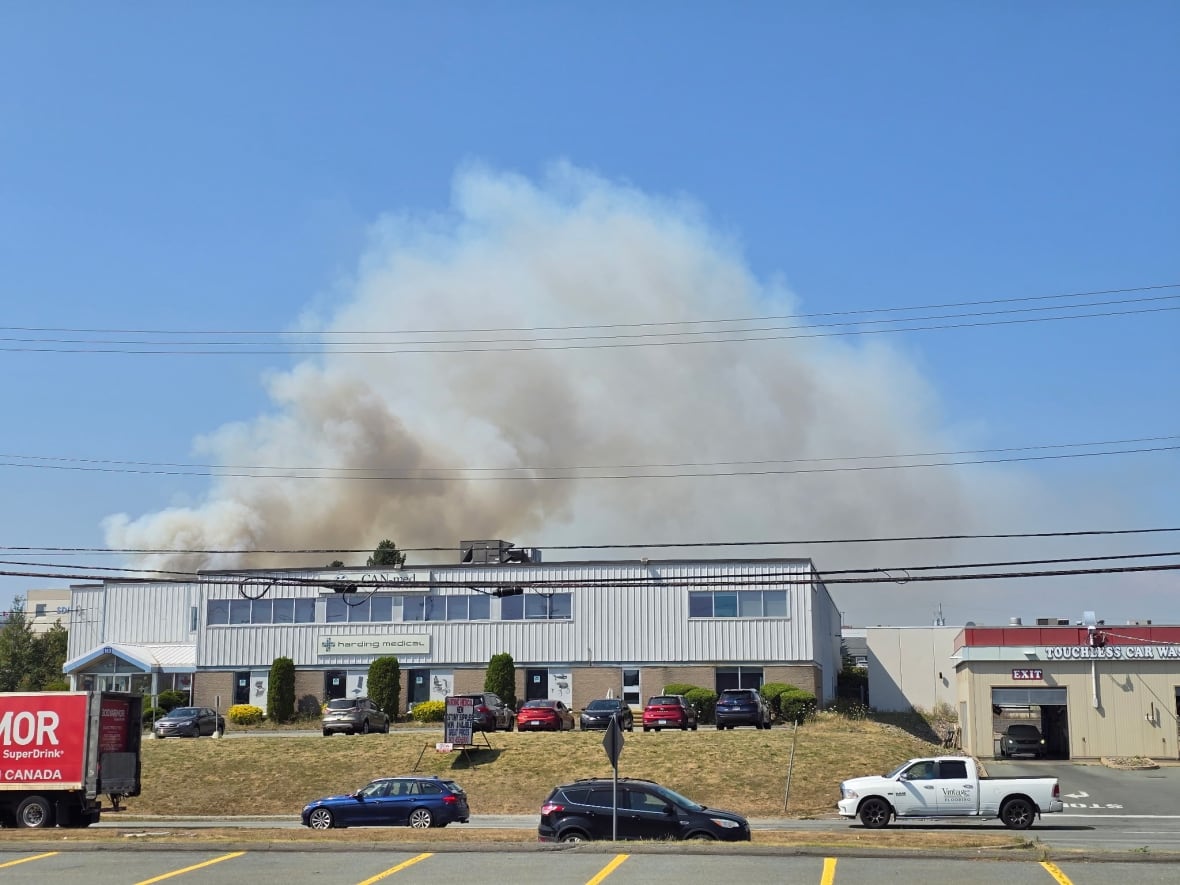A wildfire burning near a Halifax business park remains out of control Wednesday, but officials say mist and fog are making for a short window of favourable firefighting conditions.
The fire broke out around 2:30 p.m. AT Tuesday near Susies Lake in a wooded area that borders one of the entrances to Bayers Lake Business Park, about 10 kilometres west of downtown Halifax.
An update posted to a provincial Natural Resources social media page Wednesday morning said 30 firefighters were back at the scene at first light.
It said there is a short window of favourable foggy, misty conditions for ground crews. However, no aircraft is in the air due to the fog.
The fire was initially estimated to be 25 and 30 hectares. Late Wednesday morning, The Department of Natural Resources said it was now 15 hectares. It cautioned the size could change as given it is still out of control.
An alert issued by the Halifax Regional Municipality at about 10:45 a.m. said there is a mandatory evacuation of a number of businesses along the west side of Chain Lake Drive, the main thoroughfare in the business park.
Heavy smoke could be seen Tuesday afternoon. People are being asked to avoid the Bayers Lake Business Park.
The alert said Chain Lake Drive is now open in both directions between the off-ramp for Highway 102 and Julius Boulevard, but access points to the parking lots along the west side of the street from Julius Boulevard to Kent Building Supplies are closed.
Julius Boulevard remains closed, as well as Susie Lake Crescent between Julius Boulevard and Hobsons Lake Drive.
The alert said the evacuation is required to manage traffic issues and “protect residents and workers in the area.”
Roy Hollett, deputy chief with Halifax Regional Fire and Emergency, said earlier Wednesday there are no homes that have been evacuated.
However, Nova Scotia Health’s Bayers Lake Community Outpatient Centre, which was evacuated on Tuesday, will remain closed Wednesday.
“We do encourage people, if you do not need to be in that area, don’t go there,” Hollett told Information Morning Nova Scotia.
On Tuesday, yellow planes could be seen circling around large plumes of smoke.
One Natural Resources helicopter was dropping water, as were several planes sent from New Brunswick, where there are two major wildfires burning. The planes were later sent back, but could return if needed.
Officials issued an emergency alert Tuesday evening warning people not to use drones within 9.3 kilometres of the uncontrolled wildfire. The Halifax Professional Fire Fighters confirmed in a Facebook post that a drone did temporarily pause operations.

Hollett said if helicopters or planes see a drone in the air, “they will not risk hitting them.”
“It could cause a very serious air collision,” he said. “If you get caught having a drone in the wildfire area, you will be charged.”
Hollett added it’s too early to determine the cause of the wildfire. Once it is under control, Natural Resources will work with Halifax Fire to investigate.
Nova Scotia has been experiencing extremely dry conditions. Last week, the provincial government imposed a ban on people entering the woods in an effort to help prevent wildfires. People who violate the ban could be slapped with a $25,000 fine.
The federal Agriculture Department’s latest drought update, released Tuesday, said the Atlantic region received below-normal precipitation in July, with large portions of Nova Scotia receiving less than 40 per cent of normal monthly precipitation.
The report said the southwestern tip of the province is abnormally dry, while there are moderate to severe drought conditions elsewhere.
Environment Canada said smoke from nearby wildfires is reducing air quality throughout Halifax county.
The air quality statement said people more likely to be impacted by wildfire smoke, including people aged 65 and older, pregnant people and infants, should avoid strenuous activities outdoors and seek medical attention if experiencing symptoms.
The national weather forecaster said health risks can increase as smoke levels rise, so people should consider reducing or rescheduling outdoor sports, activities and events.







